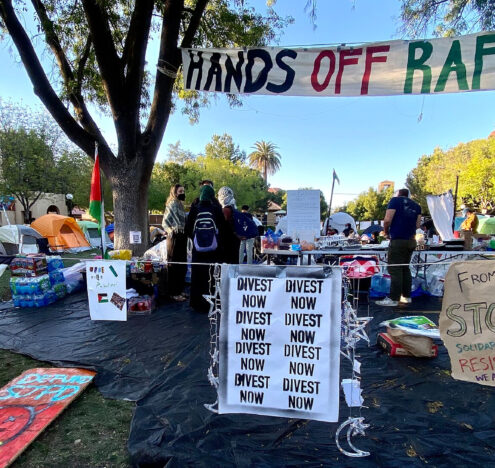Delegates from around the world are gathering today in Dubai to kick off the 28th Conference of Parties of the UN Framework Convention on Climate Change (commonly known by the acronym COP28). The annual UN climate talks gather the signatories of the UN’s Framework Convention on Climate Change and other concerned actors.
In early 2023, the United Arab Emirates (UAE), the host of this year’s UN climate talks, announced that Sultan al-Jaber, the head of UAE’s state-owned oil company, would be the President of COP28.
This move was widely perceived as a serious conflict of interest. Some recent developments have made it clear that these misgivings were absolutely right, and that the world is perilously off course in our effort to secure a livable future for humanity, thanks to the perfidy of the fossil fuel industry and its political supporters.
The Drug Dealers
An investigative report published on Nov. 27, 2023, has revealed that al-Jaber, and the UAE government, have used their meetings with foreign governments in preparation for COP28 to try to strike oil and gas export deals.
According to a former COP President, Manuel Pulgar-Vidal of Peru, naming a COP President who represents commercial interests would “undermine confidence and trust in the presidency.”
But the implications of al-Jaber and the UAE’s actions are even worse. Not only did they raise commercial interests in talks about COP28, they also tried to push deals that would undermine the very point of COP28 by expanding fossil fuel trade.
This is exactly the kind of conflict of interest that many of us were worried about.
The UAE is not alone in pushing fossil fuel exports. Its next-door neighbor, Saudi Arabia, is engaged in its own oil and gas export promotion efforts, preying on lower-income countries in Africa and Asia, by pushing for more adoption of internal combustion engine cars and supersonic aviation to increase demand for oil and gas.
Meanwhile, the United States is now the world’s top gas exporter. Exports of liquefied natural gas (LNG) from the US, Canada, and Mexico are expected to double over the next four years, with the US holding the dubious distinction of being responsible for a sizable majority of this capacity expansion.
The analogy of dealing addictive drugs is very fitting. The more dependent an economy becomes on fossil fuels, the harder it becomes to transition away from them. And yet, these three countries (and others as well) are increasing the world’s dependence on fossil fuels while holding leadership positions dedicated to combatting climate change.
Defying the Global Consensus
Even as wealthy fossil fuel-producing countries, particularly the US, declare themselves to be the world leaders on climate action (and on much else), their continuing investment in fossil fuel production is out of step with the global consensus.
The UN Environment Program (UNEP) and a number of think tanks and research institutions have been publishing the Production Gap Report for the last five years, which tracks the misalignment between agreed climate goals and governments’ continuing fossil fuel production. The 2023 report, titled “Phasing Up or Phasing Down?” highlights the global double-speak around climate action. The report found that while 151 national governments have committed to achieving net-zero emissions, they continue to expand extraction at devastating rates.
Even as wealthy fossil fuel producing countries, particularly the US, declare themselves to be the world leaders on climate action, their continuing investment in fossil fuel production is out of step with the global consensus.
This conclusion is also shared by other established, mainstream institutions. The Intergovernmental Panel on Climate Change (IPCC) warns that continuing to invest in the infrastructure around fossil fuel extraction can lead to an increase in future costs of addressing climate change, less certainty about being able to address climate change effectively, and wasted investment in fossil fuel infrastructure that will have to be abandoned while still productive when the green transition takes effect. The International Energy Agency (IEA) does not see the need for new fossil fuel production investments in its Net Zero Roadmap.
This year’s Production Gap report, released in early November, is a sobering analysis of both how badly on the wrong track the world is in terms of cutting emissions and avoiding climate catastrophe, and how some leading fossil fuel-producing countries are taking the world down a disastrous path through their energy policies.
The report finds that, based on the plans and projections of governments of fossil fuel-producing countries, global fossil fuel production in 2030 will be 110% more than the level that’s consistent with the median of a range of emissions reduction pathways to stay below 1.5 degrees Celsius of warming above pre-industrial levels. By 2050, the gap between projected fossil fuel production and the median 1.5-degree pathway will widen to a staggering 350%.
Most concerningly, the report finds that even this 1.5-degree consistent pathway may be too optimistic, because of its overreliance on unproven technologies such as carbon capture and storage and direct air capture. To be consistent with the median 1.5-degree pathway, coal, oil, and gas production in 2050, respectively, need to be 97%, 67%, and 54% less than current levels. However, a more realistic pathway that does not rely on these unproven technologies requires 98%, 90%, and 85% reduction in coal, oil, and gas production, respectively.
Profile of a Climate Wrecker
The report’s analysis of US fossil fuel policy, in particular, should be an eye-opener for US audiences, particularly for people who unquestioningly accept the official narrative of US “climate leadership.”
While the White House calls the Inflation Reduction Act (IRA) “the most significant action Congress has taken on clean energy and climate change in the nation’s history,” the report notes the “concessions to the oil and gas industry” in the IRA, such as mandating more offshore oil and gas lease sales and making renewable energy leasing on public lands and offshore waters contingent on more oil and gas leases.
The report also notes that the US Energy Secretary has called for continued fossil fuel production through 2050, and has been a booster of unproven carbon capture technology.
A Powerful Fossil Fuel Phaseout Movement
To resist the fossil fuel industry and its political backers, we need a coordinated global civil society movement that is not afraid to be confrontational. Since that’s hard to build in authoritarian countries such as Saudi Arabia, it makes it all the more imperative for those of us in the US to pose a serious challenge to our government. Such movements already exist in the US, and are often led by the communities on the frontlines of the climate crisis and the US fossil fuel buildout.
The base exists. All that’s left to do is build on it.





















